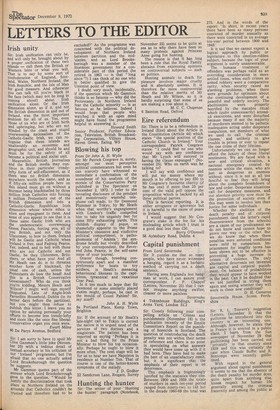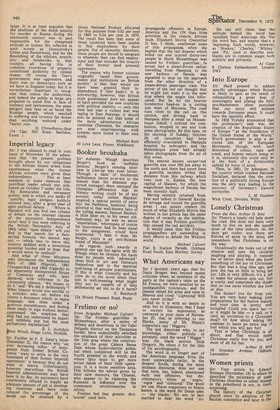Capital punishment
From Lord Savernahe Sir: It puzzles me that so many people, who have never witnessed a hanging, regard it as a barbaric f: method of carrying out a death sentence.
Having seen England's last hangman at work, I can assure your correspondent F. P. Chappel (Letters, November 25) that I cannot imagine anything swifter, cleaner Or more painless. Savernahe 4 Tokenhouse Buildings, King's Arms Yard, London EC2 Sir: Closely following your compelling article on Crimes and punishments (November 18) is the publication recently of the Emslie Committee's Report on the punishing of homicide in Scotland. The question of reintroducing the death penalty was not within their terms of reference and there is no point in speculating on what answers they would have come up with if it had been. They have had to make the best of an unsatisfactory remit, but it is significant that the emphasis of their report is on deterrence.
This emphasis is frighteningly justified by the statistics they cite. Between 1900 and 1959 the totals of murders in each ten-year period ranged from ninety-two to 143 but in the decade 1960-69 the total was 275. And in the words of the report: In short, in recent years there have been as many persons convicted of murder annually as there were convicted in an average ten-year period between 1900 and 1949.'
It is sad that we cannot expect a logical approach by public or legislature to this emotion-ridden subject, because the logic of your argument is surely unanswerable.
The humane treatment of offenders was perhaps valid as an overriding consideration in more settled times, when such crimes as armed robbery were a comparative rarity, when security raised no alarming problems, when there were grounds for optimism about the continuing development of a peaceful and orderly society. The abolitionists were properly horrified by the macabre ritual which (quite unnecessarily) attended executions, and were disturbed because many if not the majority of murderers seemed to be pathetic inadequates acting under desperate compulsion, not members of what we used to call 'the criminal classes,' and unlikely to give trouble in prison or ever to repeat the one crime of their lifetime.
Unfortunately we can no longer afford the luxury of those liberal sentiments. We are faced with a new and critical situation, a national emergency created by enemies within the state, who are just as dangerous as enemies without, since it is not at all too fanciful to fear they will bring about the complete breakdown of law and order. Desperate situations call for desperate measures, and our absolute priority now must be the protection of society even if this may seem to involve less than justice for some individuals. Whether the abolition of the
death penalty and of' corporal punishment (and the latter's rapid disappearance from the schools) are a cause of our predicament we do not know and cannot hope to prove one way or the other. But we do know that when these penalties were enforced conditions were mild by comparison. Imprisonment for lengthy terms has been shown not to be effective in preventing a huge increase in crimes of violence. The only alternative deterrents vet invented are capital and corporal punishment. On balance of probabilities they would appear to have worked in the past. Can it be doubted that we are justified in trying them again and seeing whether they will work in these new conditions? cionasm?
eron Sooutwells House. Scone. Perthshire Sir: R. L. Travers's suggestion (Letters, December 2) that the guillotine be introduced into this country is an interesting one. Although, however, he states that in France it is erected in a public Place, I learn from the Sun newspaper of November 29 that guillotining has been carried out ' privately' in that country since 1939 and this was certainly the case when Claude Buffet and R. Bontemps were recently guillotined. With regard to the general argument about capital punishment it seems to me that the absence of the death penalty for murder does, quite apart from anything else, lessen respect for human life generally among the criminal fraternity and among the public at
large. It is at least arguable that the abolition of the death penalty for murder in Russia during the nineteenth century was in part responsible for the cheapened attitude to human life reflected in such novels as .Dostoievsky's Crime and Punishment, and for the flourishing of the nihilists, anarchists; and bolsheviks in that country, all having this in common: overthrow of properly constituted authority by violent means. Of course the Tsar's government was oppressive, and there was no democracy such as we have in England today: but it is nevertheless important to recognise that unless the authorities, and indeed the public at large, are prepared to stand firm in face of violence and lawlessness, the same dangers may face us as faced the Russian people, which resulted in suffering and tyranny far worse than anything endured under Tsarist rule.
G. Chowdha ray-Best 174 gay Hill Road. Basildon, Essex )











































 Previous page
Previous page